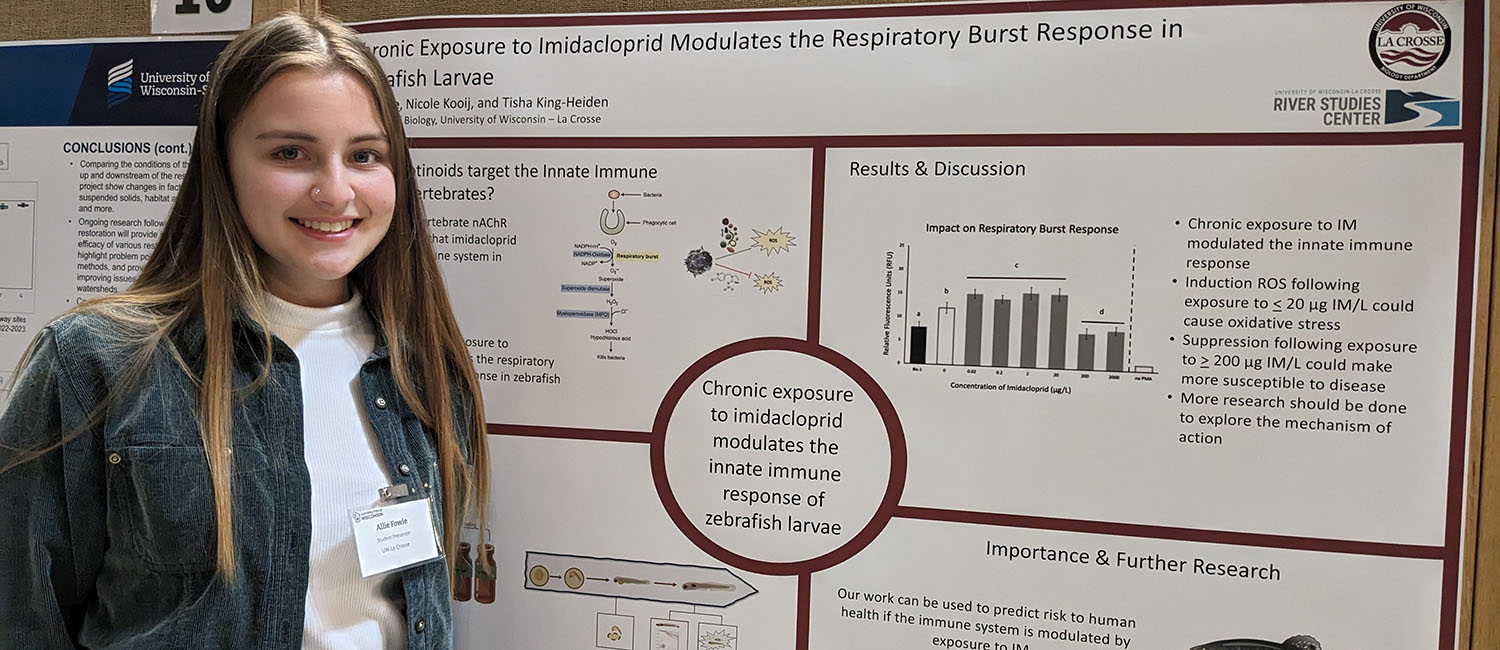The 2024 Research in the Rotunda featured 16 Freshwater Collaborative-funded research projects. Students shared more about their experience.
Student: Allie Fowle
University: UW-La Crosse
Major: Biology with minors in Chemistry and Nutrition
Expected graduation date: May 2024
Mentor: Tisha King-Heiden
Summarize the research and your role.
My research was conducted to study how an agricultural insecticide, Imidacloprid, effects the innate immune response of larval zebrafish. Imidacloprid is a neonicotinoid, which was originally created to only target insects, claiming there should be no effects on vertebrates. However, research has shown they are not solely targeting insects. Zebrafish are an important animal for research because their DNA is similar to that of wild fish and humans, meaning research results may be translational in these other populations.
By using six increasing concentrations of imidacloprid, I hypothesized with each increasing dose, there would be a decrease in the immune response, or the respiratory burst response. However, it was found there was an activation in the lower doses, followed by a suppression in the highest two doses. Though activation of the innate immune system may sound like a good thing, it can be correlated with oxidative stress, damage to cells, tissues and inflammatory diseases.
My role was through the full research process. I collaborated with my colleague in creating a research question, hypothesis, finding the best procedure, and analyzing the results. I worked about 40 hours per week, collecting eggs, dosing the embryos, creating solutions, running the experiment and analyzing data.
What skills did you learn?
Some skills I have learned were improvements in my dilution math, micropipetting, statistics, using a cell plate reader, understanding chemical interactions, microscopy, photo microscopy, creating a poster presentation, presenting at conferences, and maybe most importantly, how to combat failure.
What has been your favorite part about this experience?
My favorite part of this experience is being able to connect with others through my work. I have met students and faculty who study various parts of my research. We made connections through our work and could see from a new perspective. Not only that but I’ve been able to speak to the general public about complex scientific ideas. This is ultimately my career goal. Science is such a wonderful world, but it can be intimidating. Making science more accessible is my favorite experience.
What are some of the opportunities you’ve had because of this research?
I have talked to hundreds of people about my work. I have attended four conferences, making professional and social relationships along the way. In addition, I have had the opportunity to join the McNair Scholars Program, which has funded me to attend these conferences and travel to Portland and Louisville, which is an opportunity I would not have had without learning about undergraduate research. Additionally, this research has led to me being able to go to graduate school. My experience doing research along with the McNair Scholars Program has taught me so much about how I can obtain the future I have dreamed about.
What are your plans after graduation?
I plan to attend graduate school studying Food Science with the hopes of making food safer by not only researching various aspects of food firsthand, but also making connections with food industry scientists and the general public. I strive to make science accessible for all who are as curious as I am. My career will be in food science and safety research.
How will this experience help you attain your career goals?
I was uniquely able to study the effects of insecticides from a different perspective than a food scientist may. By understanding the unforeseen implications of these chemicals, I can keep that in mind as I study a different aspect of food. Not only will that help me throughout my career, but also having a strong research background will significantly help in my transition to grad school. I feel as though I have a comprehensive understanding of the scientific process. I know how strongly I enjoy being a researcher, which I feel lucky to have confirmed so early in my career.

